When it comes to designing a kitchen, choosing the right countertop is a decision that significantly impacts both the functionality and aesthetic appeal of the space. Quartz countertops have emerged as a popular choice for homeowners and designers alike due to their remarkable durability, low maintenance, and wide range of styles. Quartz is an engineered stone composed of natural quartz crystals, resin, and pigments, creating a non-porous surface that is both beautiful and practical. This versatile material can complement various kitchen designs, from contemporary to traditional, making it a favorite in modern kitchen remodels.
One of the standout features of quartz countertops is their durability. Quartz is one of the hardest minerals on Earth, making these countertops incredibly resistant to scratches, chips, and stains. This resilience is particularly beneficial in a high-traffic area like the kitchen, where countertops endure constant use and potential damage from sharp knives, heavy pots, and various spills. Unlike natural stone countertops such as granite or marble, quartz does not require sealing, making it a hassle-free option for busy households.
Quartz countertops also offer a high level of consistency in color and pattern. Because they are engineered, the appearance of quartz countertops can be precisely controlled during the manufacturing process. This consistency is advantageous for homeowners who prefer a uniform look throughout their kitchen. Whether you opt for a classic white quartz with subtle veining or a bold, vibrant hue, you can expect the color and pattern to remain consistent from slab to slab, ensuring a cohesive design.
In terms of aesthetics, quartz countertops are available in a wide array of colors, patterns, and finishes. This variety allows for immense design flexibility, enabling homeowners to match their countertops to their kitchen’s overall theme. For example, a minimalist kitchen might benefit from sleek, solid-colored quartz countertops, while a rustic or farmhouse-style kitchen could be enhanced with quartz that mimics the look of natural stone with intricate veining and texture. Additionally, quartz can be fabricated with different edge profiles, such as beveled, bullnose, or ogee, adding another layer of customization to your kitchen design.
The non-porous nature of quartz makes it an excellent choice for maintaining a clean and hygienic kitchen environment. Unlike porous materials like granite or marble, quartz does not absorb liquids, which means it is highly resistant to bacteria and mold growth. This property is particularly important in the kitchen, where food preparation can lead to spills and messes. A quick wipe with mild soap and water is usually sufficient to keep quartz countertops looking pristine, and there’s no need for special cleaners or sealants.
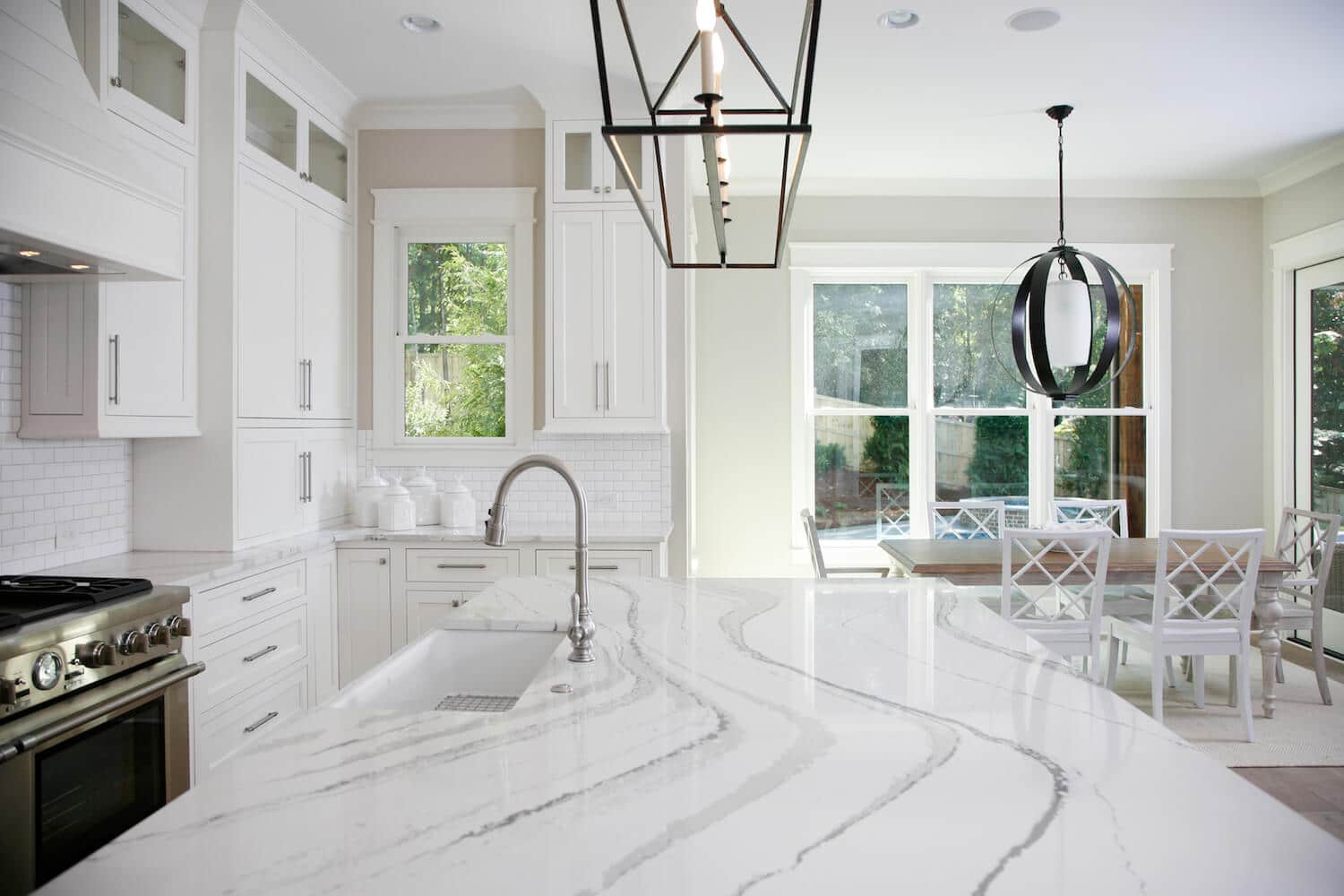
Quartz countertops are also heat resistant, though it is still advisable to use trivets or hot pads to protect the surface from extreme temperatures. While quartz can withstand a fair amount of heat, sudden and extreme changes in temperature can potentially cause thermal shock, leading to cracks. By taking simple precautions, you can preserve the longevity and appearance of your quartz countertops, ensuring they remain a beautiful feature in your kitchen for years to come.
For those concerned with environmental impact, many quartz manufacturers offer eco-friendly options. Some quartz countertops are made using recycled materials, reducing waste and conserving natural resources. Additionally, the production process for engineered quartz typically has a lower environmental footprint compared to quarrying natural stone. By choosing quartz countertops from sustainable manufacturers, you can enhance your kitchen design while also supporting environmentally responsible practices.
Another advantage of quartz countertops is their ability to blend seamlessly with other materials in the kitchen. Quartz pairs well with various cabinet finishes, backsplash designs, and flooring options. For instance, a kitchen with wooden cabinetry can benefit from the sleek, smooth surface of quartz countertops, creating a balanced contrast. Similarly, quartz countertops can complement stainless steel appliances, adding a touch of elegance and sophistication to the overall design.
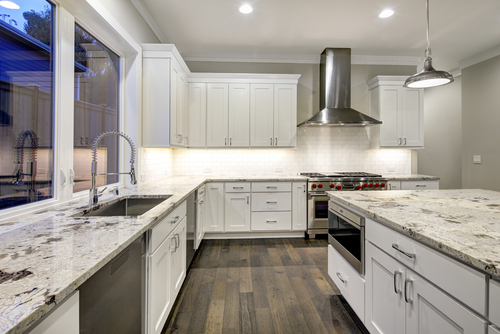
The installation process for quartz countertops is relatively straightforward, though it is generally recommended to hire professionals. Because quartz slabs are heavy and require precise cutting and fitting, professional installation ensures a perfect fit and finish. This not only enhances the aesthetic appeal but also guarantees the countertops’ structural integrity. Professional installers can also create custom features such as integrated sinks and backsplashes, providing a seamless look and additional functionality.
Maintenance of quartz countertops is simple, making them an ideal choice for busy households. Daily cleaning with a soft cloth, warm water, and mild detergent is usually sufficient to keep the countertops looking their best. For tougher stains, a non-abrasive cleaner can be used. Unlike natural stone, quartz does not require periodic sealing, saving time and effort in long-term upkeep. This low-maintenance aspect is a significant benefit for those who want a beautiful kitchen without the hassle of extensive care routines.
When considering quartz countertops, it’s important to account for the overall cost. While quartz tends to be more expensive than some other countertop materials like laminate or tile, its durability and low maintenance requirements often justify the investment. The long-term benefits of quartz countertops, including their resistance to damage and ease of care, can offset the initial cost, making them a cost-effective option over time.
Quartz countertops can also increase the value of your home. Kitchens are often a focal point for potential buyers, and high-quality countertops like quartz can make a significant impression. The durability, beauty, and practicality of quartz are attractive selling points, potentially leading to a higher resale value for your home. Investing in quartz countertops can therefore be seen as both an aesthetic and financial enhancement to your property.
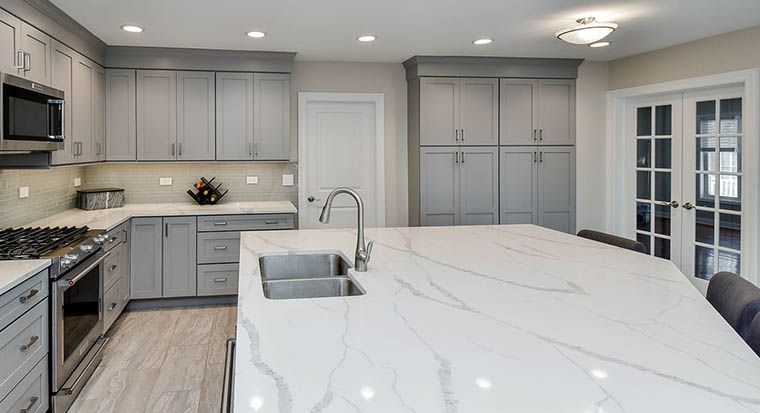
Incorporating quartz countertops into your kitchen design can also enhance the overall functionality of the space. Quartz surfaces provide ample workspace for food preparation, baking, and other culinary activities. The smooth, non-porous surface is also ideal for rolling out dough or setting down ingredients without worrying about stains or scratches. This practical aspect, combined with the aesthetic appeal, makes quartz an excellent choice for avid cooks and bakers.
Beyond the kitchen, quartz countertops can be utilized in other areas of the home, such as bathrooms, laundry rooms, and even outdoor kitchens. Their durability and low maintenance make them suitable for various applications, providing a cohesive and elegant look throughout the home. By extending the use of quartz countertops beyond the kitchen, you can create a unified design theme that enhances the overall aesthetic of your living spaces.
Lastly, the versatility of quartz countertops allows for endless design possibilities. Whether you’re aiming for a sleek, modern kitchen with minimalist lines or a cozy, traditional space with intricate details, quartz can be tailored to meet your vision. The wide range of colors, patterns, and finishes available ensures that you can find the perfect quartz countertop to complement your design preferences, making your kitchen a true reflection of your style and taste.
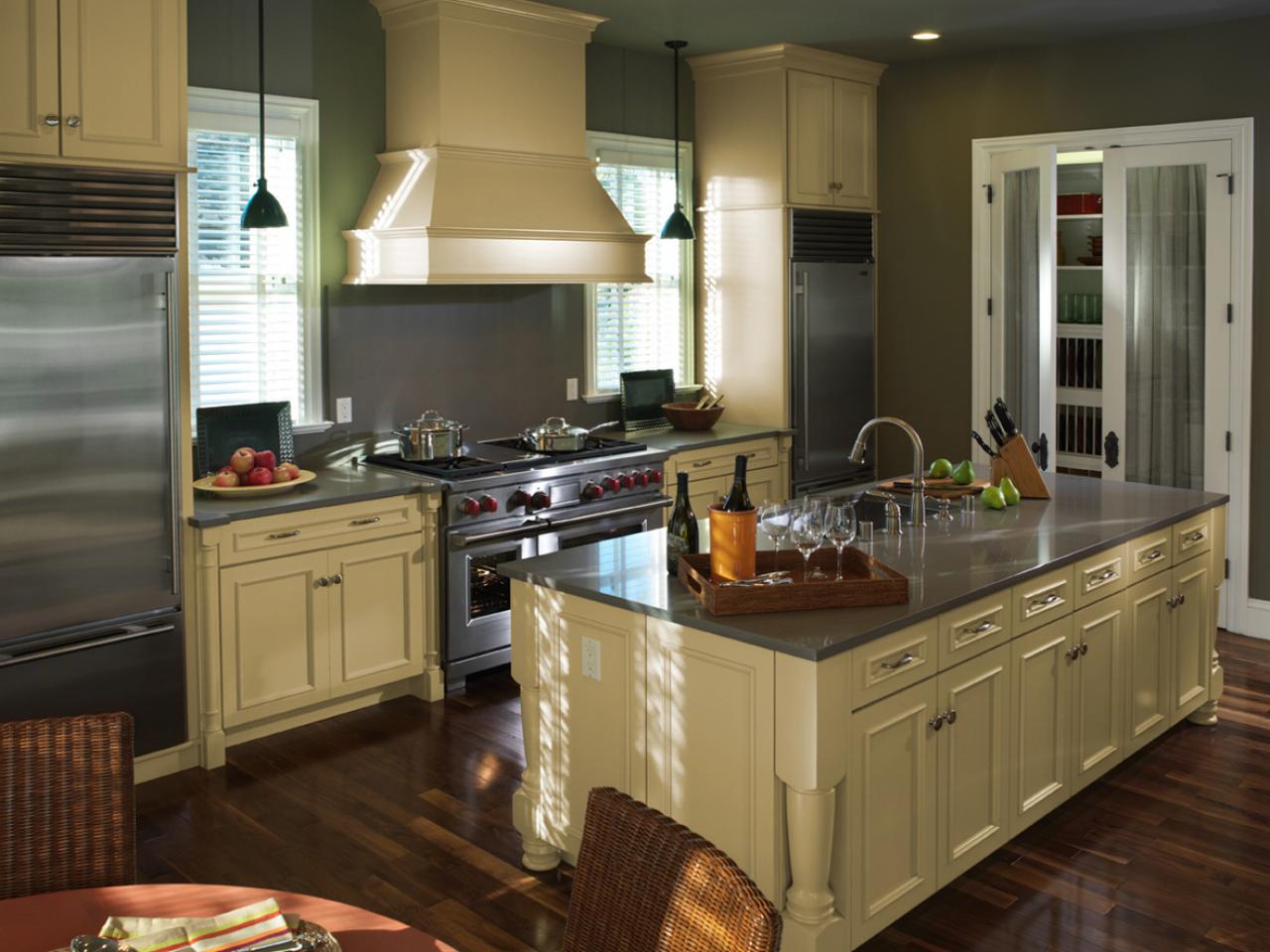
Common Mistakes to Avoid
Not Considering the Thickness: Different thicknesses of quartz slabs can affect both the cost and the look of your countertops. Thicker slabs are typically more durable and offer a more substantial appearance, but they can also be more expensive. Choose the thickness that best suits your budget and design needs.
Ignoring Seam Placement: Quartz countertops are usually fabricated in large slabs, but seams are inevitable for expansive countertops. Poorly placed seams can be an eyesore. Plan the layout carefully to minimize visible seams and ensure they are placed in less conspicuous areas.
Overloading with Heat: While quartz is heat resistant, it’s not impervious to thermal shock. Placing hot pots or pans directly on the surface can cause cracks. Always use trivets or hot pads to protect your countertops from heat damage.
Using Abrasive Cleaners: Although quartz is durable, using abrasive cleaners or pads can scratch the surface. Stick to mild soap and water or non-abrasive cleaners specifically designed for quartz to keep your countertops looking their best.
Ignoring Color Samples: The appearance of quartz can vary under different lighting conditions. Always take home samples and observe them in your kitchen’s lighting before making a final decision. This ensures the color and pattern match your expectations.

How do quartz countertops compare to granite in terms of durability and maintenance?
Quartz countertops are generally more durable and lower maintenance compared to granite. While both materials are highly durable, quartz is non-porous, making it resistant to stains and bacteria without the need for sealing. Granite, being a natural stone, requires periodic sealing to maintain its resistance to stains and bacteria. Additionally, quartz is less prone to chipping and cracking than granite, making it a more resilient choice for busy kitchens.
Can quartz countertops be customized to fit specific kitchen designs?
Yes, quartz countertops offer a high degree of customization. They can be fabricated in various shapes, sizes, and edge profiles to fit your kitchen’s layout and design preferences. Whether you need a specific edge profile, an integrated sink, or a unique backsplash design, professional fabricators can tailor quartz countertops to meet your exact specifications, ensuring a perfect fit and a cohesive look in your kitchen.
Are there any environmental benefits to choosing quartz countertops?
Many quartz countertop manufacturers prioritize sustainability by using recycled materials and implementing environmentally friendly production processes. Choosing quartz countertops from these manufacturers can reduce the environmental impact of your kitchen renovation. Additionally, the long lifespan and low maintenance requirements of quartz contribute to a more sustainable choice compared to materials that need frequent replacement or extensive upkeep.
How should I care for and maintain my quartz countertops?
Quartz countertops are easy to care for. Clean them regularly with a soft cloth, warm water, and mild soap. Avoid using abrasive cleaners or scouring pads that can scratch the surface. For stubborn stains, a non-abrasive cleaner can be used. Although quartz is heat resistant, always use trivets or hot pads to protect the surface from extreme temperatures. With these simple maintenance steps, quartz countertops can remain beautiful and functional for many years.
Are quartz countertops a good investment for increasing home value?
Investing in quartz countertops can potentially increase your home’s value. High-quality countertops are a major selling point for potential buyers, and the durability, low maintenance, and aesthetic appeal of quartz are particularly attractive. Kitchens are a focal point in many homes, and having modern, durable, and stylish countertops can make a significant difference in both the functionality and perceived value of the space, making quartz a worthwhile investment.

Many Looks and Benefits of Quartz countertops
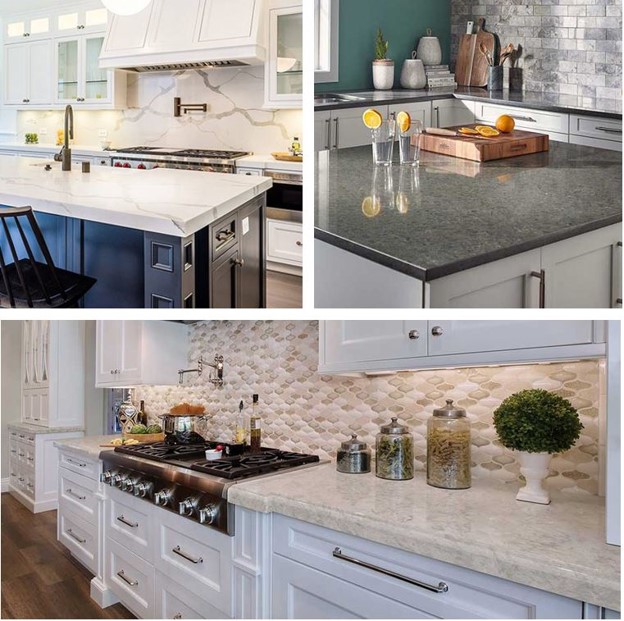
Granite vs. Quartz: Is One Better Than The Other?
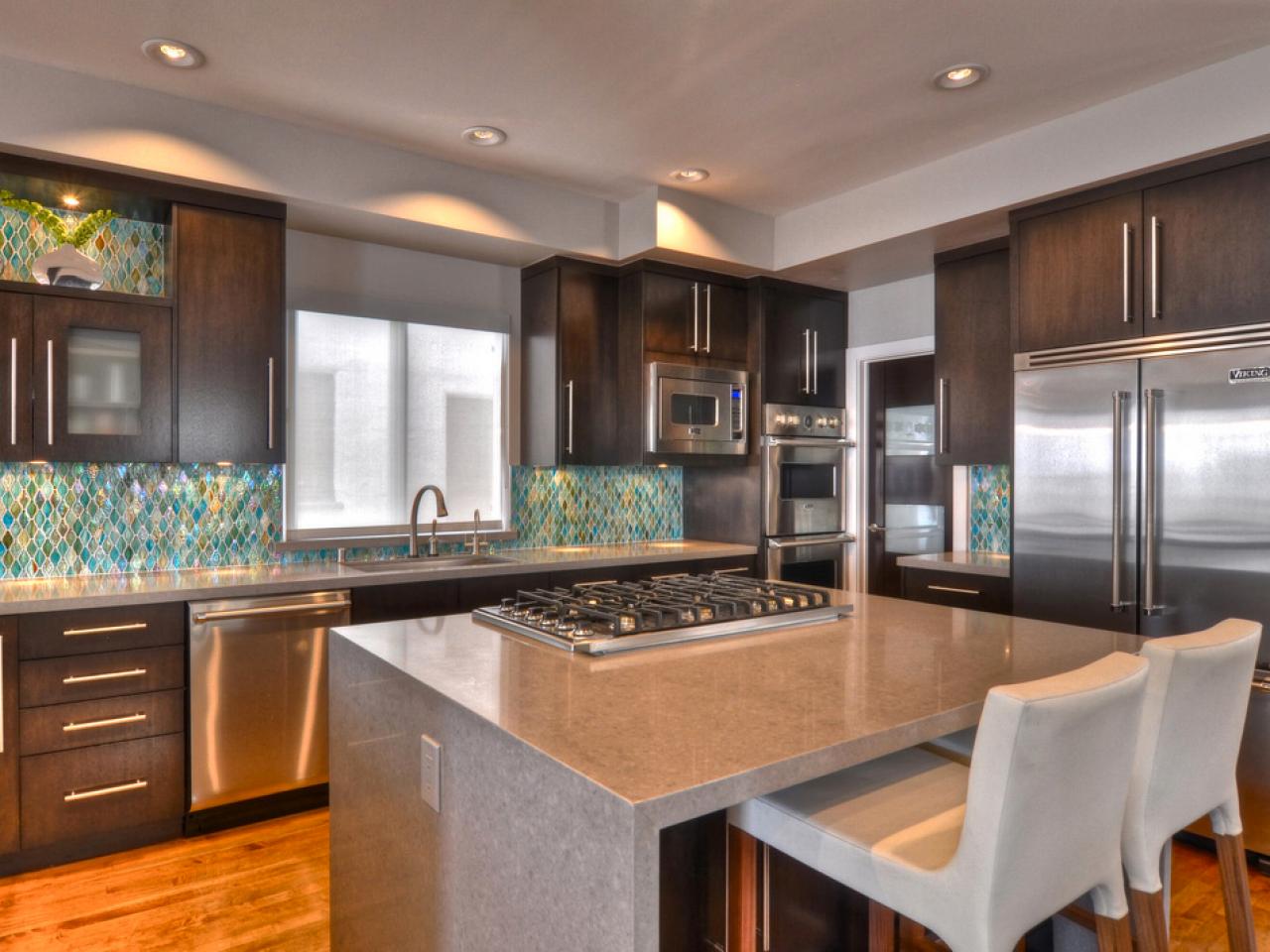
Different Types/Brands of Quartz Countertops for Kitchens
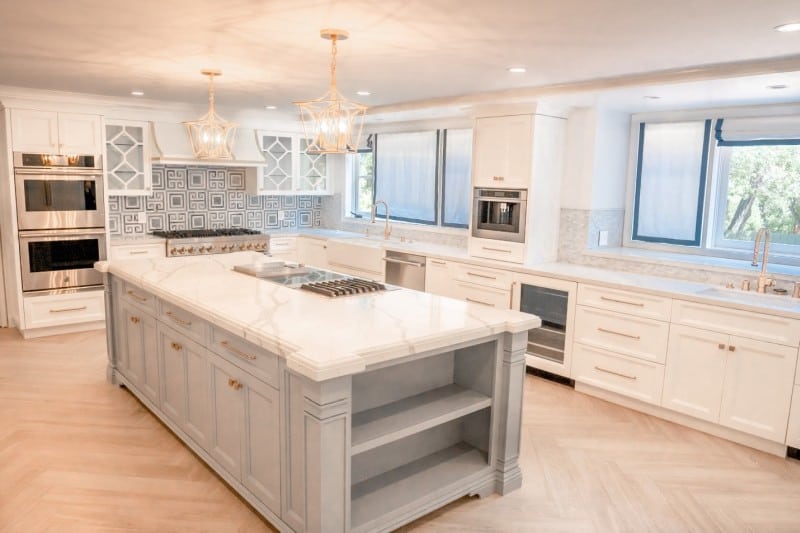
Quartz Countertop Modern Kitchen
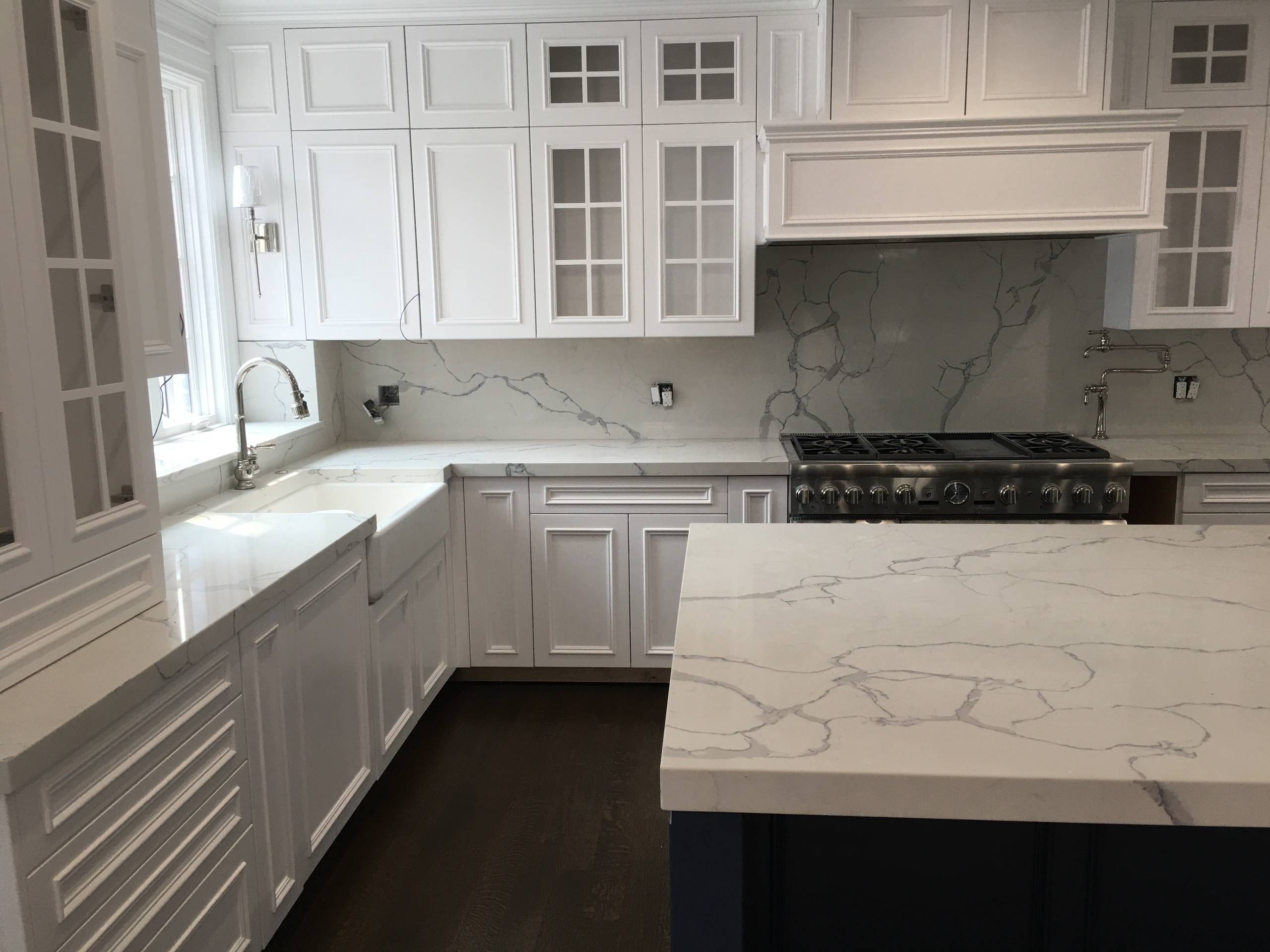
Why Are Quartz Countertops So Popular?
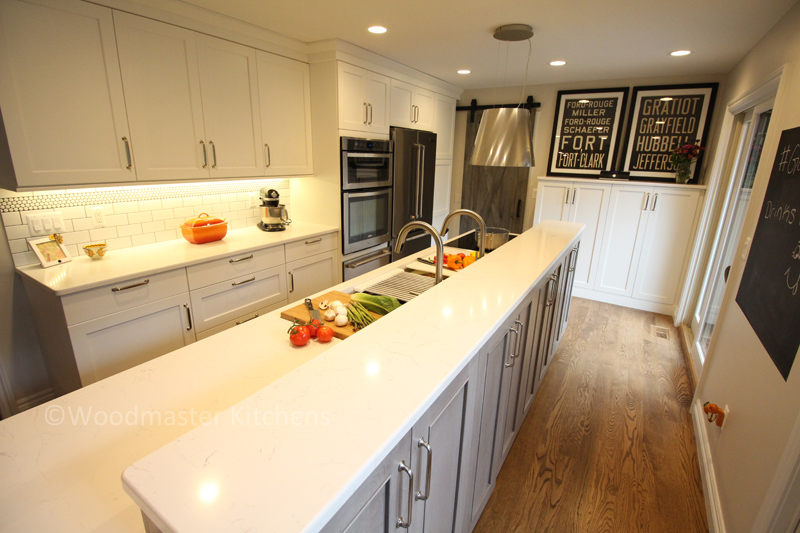
Related articles: